
By Cindy Greenberg
It’s not hard to feel a sense of despair in these extraordinarily difficult times for Jews in Israel and around the world following the horrors of Oct. 7, the upsurge in antisemitism close to home, and the continuing loss of human life.
In times of despair, Jewish tradition offers us a path to hope, repair, and connection: service. In times of brokenness, we are called upon to ask: “What can I do to make things better?” Through service, we can address the most pressing needs in our communities, build connections, and restore our own sense of purpose.
Since Oct. 7, we have seen an unprecedented mobilization of mutual aid work in Israel. Volunteers are meeting urgent needs: identifying housing for people who have been displaced, running schools for displaced children, and supporting farms that have lost their agricultural workers. People are cooking meals for soldiers, displaced neighbors, and families impacted by the call-up of army reservists. In the early days of the war, numerous volunteers mobilized to collect, organize and distribute everything from food and toiletries to mobile phone chargers and clothing for those who needed it.
Service has a critical, long-term role to play not just in this time of crisis and in supporting recovery efforts in Israel, but in sustaining Jewish life and community in North America.
American Jews, too, have turned to service as a meaningful response to the crisis. At Repair the World, the organization I lead, the number of Jews turning to Jewish service since the start of the war has surged. Some have organized supplies to directly support Israelis and others have contributed to their own communities. Some are seeking out Jewish community because they are feeling less comfortable in other spaces. Others cite the rise of antisemitism and the importance of building bridges with their neighbors. All are looking for a way to find meaning and purpose.
For almost 15 years, Repair the World has been mobilizing Jews to serve, grounded in the idea that through service we can both strengthen our Jewish community and also make social impact. Our research clearly demonstrates that meaningful acts of service, grounded in Jewish learning and designed to address true community needs, can transform people and communities.
In Israel, several organizations, most notably Birthright Israel, MASA and Yahel already have mobilized Jews from North America to volunteer in Israel. This work should expand dramatically in the coming months. We know that service is one of the most powerful ways to build bridges across lines of difference. By volunteering in Israel in partnership with Israelis, American Jews can contribute to Israel’s recovery while building meaningful connections with their Israeli counterparts, deepening their own connection to Israel and providing a spiritual boost to Israelis by showing them that world Jewry is with them. Serving in Israel also can inspire an ongoing commitment to service once volunteers return home, which is a meaningful way for them to continue to live their Jewish values.
We must ensure that the American Jewish service in Israel holds true to what we at Repair the World have learned is most effective: that the service meets real needs, is done in partnership with those impacted and includes Jewish learning. Service is a universal value, but Jewish tradition has much to say about how we offer it, and participants should explore Jewish wisdom about how service should be approached.
Service that combines these components — that actually contributes to relief and recovery efforts and cares about the experience of American Jewish volunteers — will have the biggest impact.
Back in the United States, we’re seeing young American Jews who may be feeling alone or distressed seeking new ways to connect to Jewish life and Jewish community. We need to recognize that service is a form of deep Jewish expression and do everything possible to welcome these young Jews into our Jewish community of purpose that focuses its time and energy on making the world better.
And at this time of rising antisemitism, there are young Jews expressing a newfound desire to be part of a movement that connects Jewish communities with other communities. Most of our organization’s service work is done in deep partnership with non-Jewish communities, including those that are low-income, largely immigrant, on the socioeconomic periphery or communities of color. We’re building bridges by working arm in arm in places like soup kitchens, food pantries, after-school programs and organizations supporting those experiencing homelessness.
Finally, service gives those who participate a sense of well-being, purpose, and connection to their peers. Among volunteers who have served in our programs, 90% indicated that Repair programs contributed to their overall health and well-being.
In these challenging times, service is a powerful statement of hope – a statement that our actions matter. Tikkun olam isn’t just about repairing the world, but repairing ourselves.
This story was sponsored by and produced in collaboration with Repair the World, which mobilizes Jews and their communities to take action to pursue a just world, igniting a lifelong commitment to service. This story was produced by JTA’s native content team.





